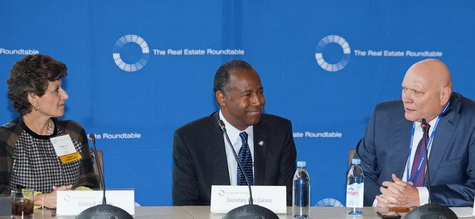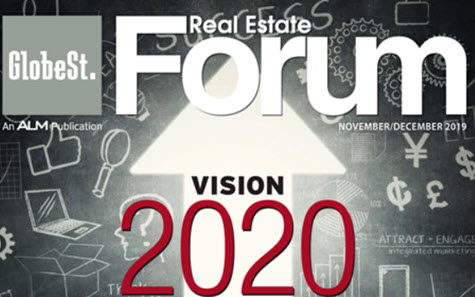
Congress faces a Dec. 20 deadline to fund the government or risk a shutdown as the impeachment process continues in the House, with a likely trial in the Senate beginning in January.
House Majority Leader Steny Hoyer (D-MD) told reporters this week, "I don't want to contemplate having bills pushed over [into 2020] because we can't get agreement.” (CQ, Dec. 4)
# # #

[Left to right: Roundtable Chair Debra Cafaro (Ventas, Inc), HUD Secretary Ben Carson and Roundtable President and CEO Jeffrey DeBoer discuss affordable housing issues during The Roundtable's Fall 2019 Meeting.]
The U.S. Department of Housing and Urban Development (HUD) on Nov. 22 published a Request for Information (RFI) seeking public comment on Federal, State, local, and Tribal laws, regulations, land use requirements, and administrative practices that may pose barriers to affordable housing development.
• State and local governments to adopt and implement Yes in My Backyard (“YIMBY”) land-use policies such as high-density zoning and expanding by-right multifamily zoned areas, to entitle affordable housing projects;
• Development of low-income and workforce housing units as a priority when the U.S. government disposes under-utilized and surplus federal properties;
• Construction of manufactured housing – the only form of housing regulated by a Federal building code that includes standards for health, safety, and energy efficiency – as a gateway that opens the door for homeownership for millions of families;
• An assessment of how short-term rental platforms (like Air BnB and Vrbo) may reduce supplies of units otherwise available for long-term housing;
• Mortgage underwriting standards that reduce barriers for first-time buyers with student loan debt to also qualify for federally-backed FHA loans geared toward low- and moderate-income borrowers;
• Increased support for HUD’s Section 8 voucher program to assist very low-income, elderly, and disabled Americans to afford housing in the private market; and
• Modernizing the role of Fannie Mae and Freddie Mac through GSE reform, to focus their mission on providing liquidity in mortgage markets geared toward low-income and middle-class home ownership.
On November 1, Roundtable President and CEO Jeffrey D. DeBoer raised these priorities in a housing affordability summit at the White House with HUD Secretary Carson and other industry leaders. DeBoer’s comments followed on the heels of Secretary Carson’s remarks to The Roundtable several days prior during its 2019 Fall Meeting. (Roundtable Weekly, November 1, 2019).
Affordable housing will be a focus of discussion during The Roundtable’s Jan. 28-29 State of the Industry Meeting in Washington, DC.
# # #

The Real Estate Roundtable is featured as one of the industry’s “Influencers in Marketing and Communications” in the November / December issue of Real Estate Forum magazine published this week.
The Roundtable will debut its 2020 National Policy Agenda publication during its State of the Industry Meeting on Jan. 28-29 in Washington, DC.
# # #